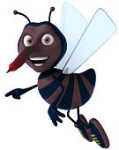Health department urges residents to reduce exposure to West Nile virus

McCOOK, Neb. -- As you spend time outdoors with summer activities, Southwest Nebraska Public Health Department (SWNPHD) reminds you to protect yourself and your horses against West Nile Virus. West Nile Virus is spread through the bite of a mosquito that has contracted the virus from an infected bird. In 2013, 226 human clinical cases and five deaths were reported through the Nebraska Department of Health and Human Services (DHHS), Division of Public Health. There were 1,100 positives cases of West Nile Virus in horses during the 2002 outbreak.
SWNPHD provides surveillance data to DHHS by trapping mosquitoes in Chase and Red Willow counties. All human cases in southwest Nebraska are investigated by DHHS and SWNPHD. Nebraska Department of Agriculture handles any possible cases involving horses.
"One of your best defenses of preventing West Nile Virus is to apply mosquito repellant," states Tami Herskowitz, Public Health Surveillance Nurse at SWNPHD. "Mosquito repellant helps reduce your exposure to mosquitoes that may carry the virus."
By using repellent, it allows you to continue to play, work, and enjoy the outdoors with a lower risk of getting bit. Apply repellent when you go outdoors, even if it's only for a few minutes. The most effective repellents contain DEET.
Other precautions include dressing in long-sleeved shirts, pants and socks when you're outside. You are encouraged to avoid outdoor activity around dawn and dusk when mosquitoes are more active.
Eliminating the potential for breeding grounds around your home will certainly help reduce the mosquito menace around your property.
For example: drain children's wading pools when not in use replace water in bird baths every 3 to 4 days drill a hole in tire swings or recycling containers so water can drain out check for clogged rain gutters and clean them out (roof gutters can produce millions of mosquitoes each season) remove discarded tires, and other items that could collect water clean vegetation and debris from the edges of ponds dispose of cans, plastic containers, ceramic pots or similar water-holding containers turn over wheelbarrows aerate ornamental pools or stock them with fish clean & chlorinate swimming pools not in use (watch for stagnate water on the pool cover) mosquitoes may breed in any puddle that lasts for more than four days
Suggestions to prevent mosquitoes from affecting your horses provided by the Nebraska Department of Agriculture include:
* House horses indoors during peak periods of mosquito activity (dusk & dawn)
* Avoid turning on lights inside the stable during the evening and overnight
* Place incandescent bulbs around the perimeter of the stable to attract mosquitoes away from the horses Remove all birds (including chickens) that are in, or close to, the stable
* Topical preparations containing mosquito repellants are available for horses
* Fogging of stable premises can be done in the evening to reduce mosquitoes
* Recommend approved West Nile Virus vaccine for your horse from a veterinarian
More information on West Nile Virus may be found at our web site www.swhealth.ne.gov or call the McCook office at 308-345-4223. SWNPHD is located at 404 West 10th Street -- one block north of Arby's. You can also follow us on Facebook & Twitter.
